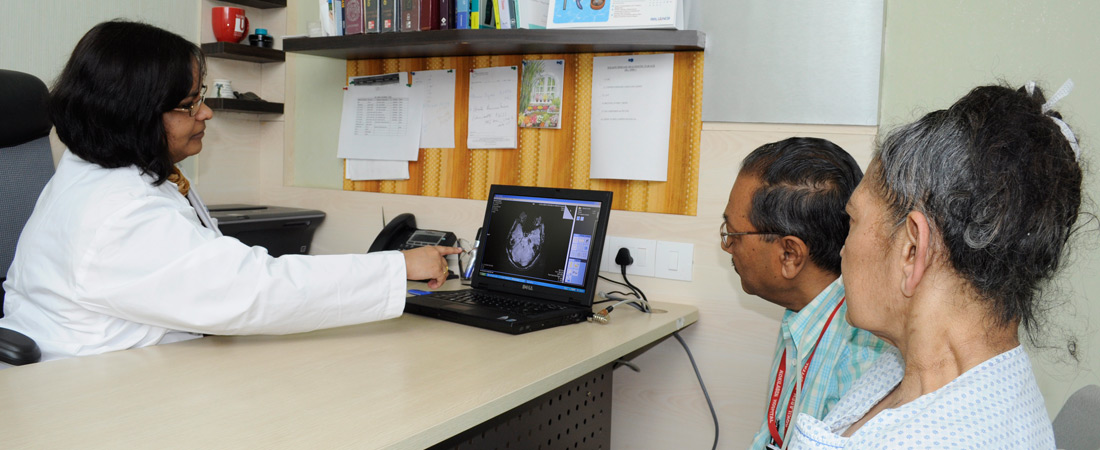
Parkinson disease is a progressive neurodegenerative disease.People affected by Parkinson disease may develop various symptoms including tremor, stiffness or rigidity in their legs and arms, slowness of movements and /or imbalance.In the early stages there may be a slight shaking of hands or walking difficulty that is barely noticeable. Over time the symptoms may become more pronounced resulting in unclear speech and varied physical disability.
Parkinson usually develops in people over the age of 60 years. The risk of developing Parkinson increases with age. It affects both men and women.
Rarely Parkinson disease develops in people at 40 years or so – called young onset Parkinson disease.
Parkinson disease is a Movement Disorder.It results from loss of brain cells (neurons) in an area of brain called the substantia nigra that modulates movements. The cells of substantia nigra involved in Parkinson disease produce a chemical called dopamine.Deficiency of dopamine is believed to be responsible for most of the symptoms of Parkinson disease.
Diagnosis of Parkinson disease is based on a through neurological examination and is best done by a neurologist who is a Movement Disorder Specialist. Many diseases may mimic symptoms of Parkinson disease and it is essential to exclude these through clinical examination and appropriate tests (blood tests, brain imaging).
Various diseases can mimic Parkinson disease. Treatment of these diseases is different from Parkinson’s Disease. Consultation with a Movement Disorder Specialist is essential for early diagnosis and prompt treatment.
Some of the diseases that may resemble Parkinson’s Disease are:
There is effective medical treatment available to alleviate symptoms of Parkinson disease.
With treatment people with Parkinson disease can lead a normal and active life. They can be independent and continue to work throughout their natural lives.
There a number of medications available to treat Parkisnon disease.
Parkinson disease is a progressive disease and symptoms worsen over time. However, there is effective medical treatment available that can be modified over time to keep pace with the disease progression.
Generally medications used to treat Parkinson produce a steady response that is sustained throughout the day.
Motor fluctuations are best treated by modifying the doses and timing of various drugs. These are best done by a neurologist who is a Movement Disorder Specialist.
There is an effective surgical treatment for Parkinson disease. Surgery is indicated for patients who have symptoms despite best medical treatment. With surgery even people with disabling motor fluctuations can resume normal lives and return to work.
People affected with Parkinson disease may experience pain in muscles, constipation, problems related to urine control, sleep, vivid dreaming, enacting dreams, impairment in smell, giddiness, weight loss, impulse control disorders, confusion or hallucinations.There is effective treatment available for these non- motor symptoms.
Kokilaben Hospital offers the opportunity to consult world class experts and avail of the state of the art in technology to diagnose, treat and rehabilitate people with Parkinson and Movement Disorders.
This is a specialist clinic for people with neurological problems resulting in Movement Disorders. The clinic offers a comprehensive screening and care program for Parkinson and other Movement Disorders including neurology consultation, physical and cognitive rehabilitation and, psychotherapy.
The mission of the Clinic is to provide state of the art multidisciplinary care to patients with Parkinson disease and their families.
Alzheimer is associated with deposition of abnormal proteins in the brain, brain cell death and brain shrinkage. The exact causes and risk factors of Alzheimer are subject of active research.
3 Tesla MRI: Specialised MRI protocols like morphometric MR, volumetric MR, Diffusion tensor imaging (DTI), can help elucidate brain structure and networks and help identify conditions mimicking Parkinson.
Rehabilitation: Kokilaben Hospital has dedicated 30,000 sq ft of floor area equipped with cutting edge equipment to provide personalised and goal directed physiotherapy, speech therapy and gait retraining. Our specialised physical and cognitive occupational rehabilitation program ensures that patients achieve their full potential
Movement Disorder Clinic: Parkinson disease screening and care
Rehabilitation: This package is designed to design treatment and to rehabilitate patients with Parkinson and other movement disorders. Total parkinson care program: Launched by our Chairperson Mrs. Tina Ambani, in 2009.
Milestones of the movement disorder clinic
Stay updated to all the latest news and offers at KDAH
